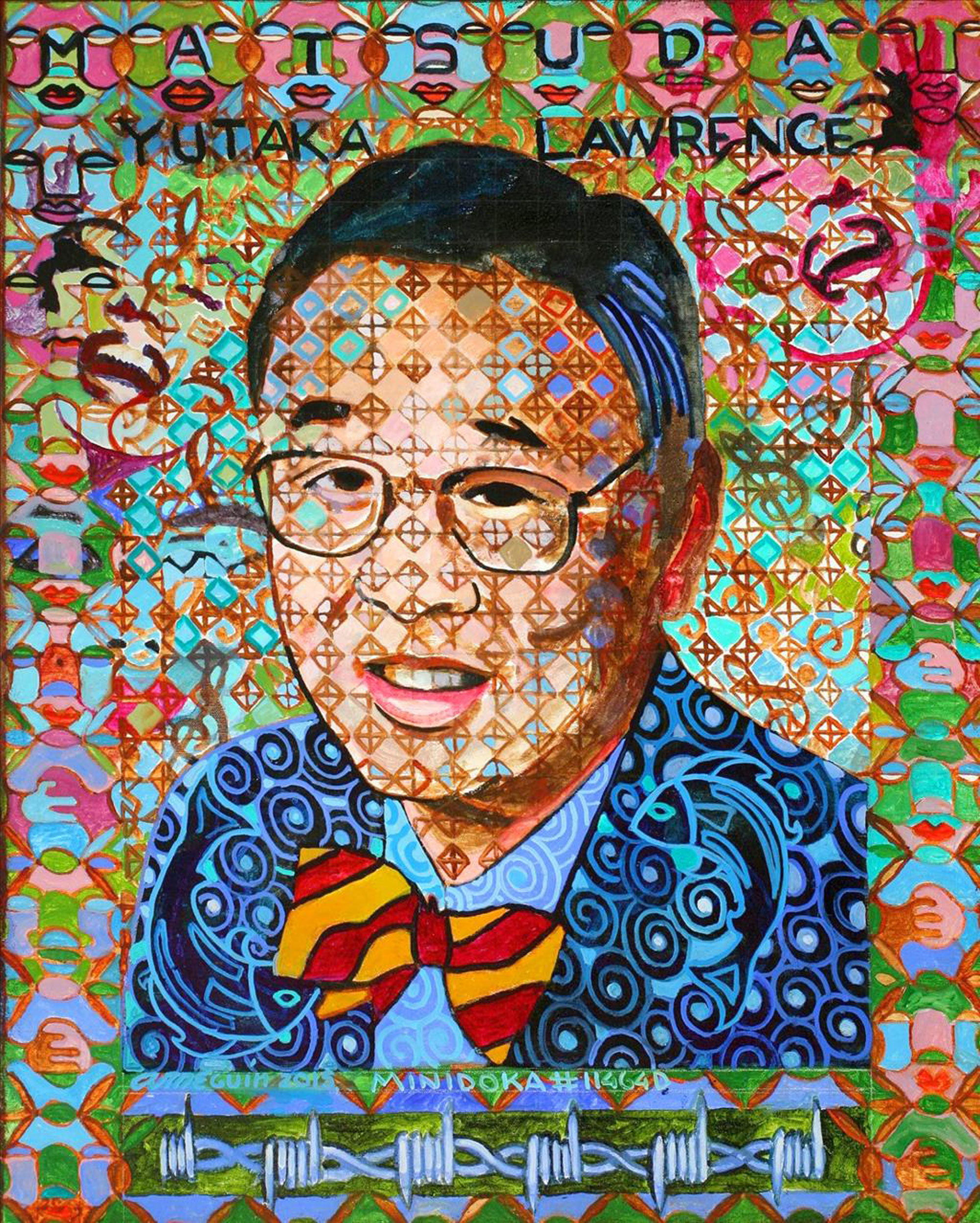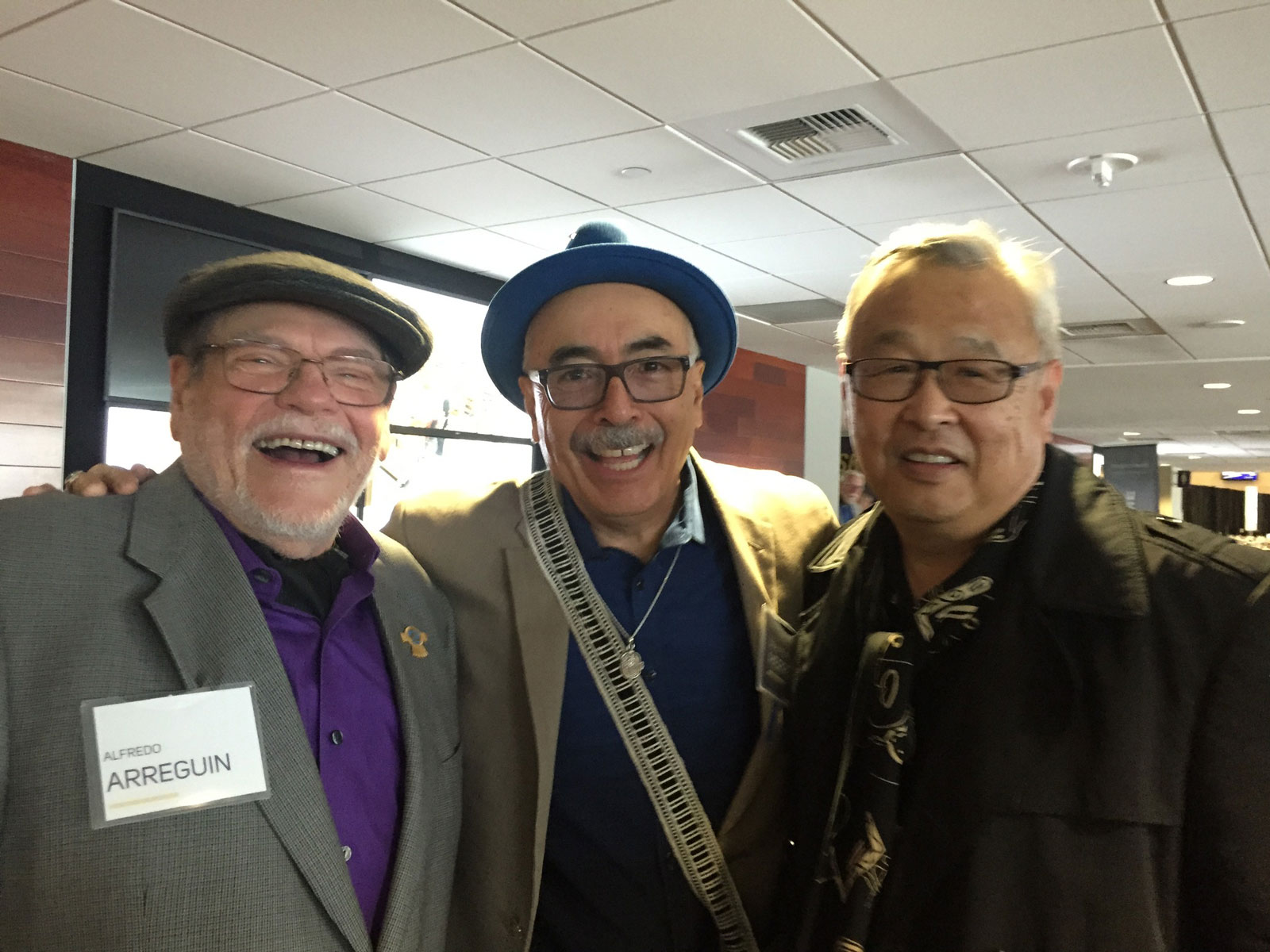Full of surprises Full of surprises Full of surprises
Poet Lawrence Matsuda shares memories of painter Alfredo Arreguín.
By Quinn Russell Brown | May 19, 2023

Much has been written about the remarkable life of painter Alfredo Arreguín, who died on April 24, and much more will continue to be compiled by scholars, artists and art historians as his life turns into a legacy. The two-time UW grad (’67, ’69) was born in Mexico and moved to the Pacific Northwest in his 20s. He was one of the university’s up-and-coming artists of the 1960s, along with Chuck Close, ’62, Dale Chihuly, ’65, and Roger Shimomura, ’61. Arreguín’s stories about the Blue Moon Tavern have become the stuff of legend.
As a painter, Arreguín was a visionary who could see a world invisible to the rest of us, a world of rich colors, hypnotic patterns and pulsing energy. As a member of the creative community, he was a firebrand for Latin American art. UW Professor Lauro Flores summed up the painter’s signature style with the title of a 2002 monograph, “Alfredo Arreguín: Patterns of Dreams and Nature.” In addition to collections like the Smithsonian in Washington, D.C., and the National Museum of Mexican Art in Chicago, his work also hangs in U.S. embassies and in schools around Seattle.
Arreguín remained loyal to oil paint even as acrylics enticed many post-war painters. Still, he was always more Modern Art than Old Master, drawing his figures in thick outlines, usually with little shading or modeling, always with joy and exuberance, even impudence. His work also reaches back to ancient art and Eastern prints, from Maya and Aztec designs to Japanese ukiyo-e paintings.
We caught up with Lawrence Matsuda, ’67, ’73, ’78, the former president of the UW Alumni Association, to hear how he got to know Arreguín and what the painter meant to the UW community. Matsuda was a founding member of the UW Multicultural Alumni Partnership (MAP), and you can read more about Arreguín’s contributions to the Office of Minority Affairs & Diversity here.
UW Magazine: How did you first cross paths with Arreguín?
Lawrence Matsuda: I met Alfredo through a scholarship breakfast for minority students at the University of Washington in the mid-90s. He said he would donate a piece of his work to the MAP auction every year for as long as he was alive. He always gave us an auction item, and it always was a fundraising item that did well. He was for real. He was always at the breakfasts. He had a scholarship in his name.

Alfredo Arreguín (left) and Lawrence Matsuda (right) smile with Juan Felipe Herrera, American poet, performer, writer, cartoonist, teacher and activist.
UW Magazine: What stood out to you about him in the early days?
Matsuda: On paper, he looks very much like a maestro, like a conductor or an opera singer.
But he was really a personable and friendly person. He was down to earth. Still, he didn’t hide who he was, and he celebrated that he had come a long way. He was full of surprises, so generous and easy to be around. If you were around him, you were enjoying yourself.
I always wondered how he could have that kind of energy and positivity to be that kind of person. He was spiritual, childlike, full of imagination and creation. Once he sits down, he becomes the king, and everyone else is at his feet as he tells these wonderful, crazy stories.
UW Magazine: Can you share a favorite story about him?
Matsuda: Once he put two of his paintings on top of his car, without tying them down, and he drove home. When he got there, the paintings were still on top of the roof. He couldn’t believe it. He said, “They didn’t fall off the car when I drove home.”
Alfredo didn’t have a heavy Spanish accent, but it came from a Spanish-English mixture, so when you heard him speak, it almost sounded like melodies.
The only way you could catch his stories like this was in poetry, where you can bend the words and the ideas. If you did it straight up, it would lose a lot of the “stardust.” I wish I could have sat him down and had him record all his other stories.
“Rose City Vacation” excerpt from “Boogie Woogie Crisscross” (Cave Moon Press, 2023)
In Portland, Oregon I rise in my hotel room,
pillows strewn helter-skelter,
scene reminiscent of marshmallows floating
in a hell’s broth. I recall our mutual friend, Alfredo,
who lands in Portland like a shanghaied sailor
unable to remember anything beyond
his Blue Moon Tavern binge in Seattle the night before.
Alfredo’s adventure rivals the night he stacked
two unsecured paintings on the roof of his car,
navigated hills under the influence
and pin-balled down Ravenna Avenue.
His canvases must have sprouted Edvard Munch-like
expressionist arms and hands to grip their extraterrestrial
mosaic faces in fear as they screamed all the way home….
—Lawrence Matsuda
UW Magazine: You also connected with Arreguín through a shared sense of finding yourself, as you both navigated your family history. You wrote a lovely poem about it. (See poem below.) Can you tell me about this?
Matsuda: For a long time, Alfredo was told that his father was dead. But that wasn’t true, and eventually he met his father. When I heard about how he was liberated by the reunion with his father — and the recognition from his father — it kindled something in me, because my father was a damaged person. He never recovered from losing his grocery business and being sent to a WWII American concentration camp for almost four years because of his race without committing a crime. I thought, “At least your father likes you.”
On my father’s deathbed, he said to the nurses, “I wasn’t a good father.” That was the first time he told the truth. Hearing about how Alfredo’s father wanted to recognize him, it was like how my father recognized me.
I wrote the poem in 2008 and published it in 2010. We went fishing, and we scaled Hokusai’s tidal waves, up and down until we scaled Mount Fuji, the holiest mountain. The trick of the poem was that we became one, in a sense, that we both found our identities. I was a conquistador, and he was a samurai, and he was a conquistador, and I was a samurai. Through this adventure, all the things about our fathers and our pasts — they don’t matter. It was like we both agreed that adventure would be the compass of our life, our compass to the essence of everything.
“Finding Morelia, Michoacán de Ocampo” from “A Cold Wind in Idaho” (Black Lawrence Press, 2010)
for Alfredo Arreguín
Wine glasses purple to the brim
sooth the restless soul.
Alfredo no longer the aspiring artist who
swings on Blue Moon Tavern chandeliers.
Tonight he holds court,
remembers his childhood trip
with his grandfather
to Morelia, Michoacán.
Family, he says, means more than fame.
His English words ripe –
smooth and luscious,
in their Mexican precision
launch like fireworks: skyrocket
to the ceiling, explode into ever-expanding
bursts of colors, then cascade as embers.
Alfredo recalls peering through train windows
beyond clouds of sooty smoke that yield
to a lush countryside, purple mountains.
Thick forests and billowing seas of dried grass
emerge. Pintos gallop with abandon
to the chunking rhythm of the train from Morelia,
place of his birth, home of Conquistadors.
A majestic city glows golden in his paintings,
surrounded by green jungles teeming
with red-orange toucans
and yellow-eyed jaguars.
Alfredo dances barefooted in the town square,
l’enfant terrible, a fatherless orphan of love.
Love means more than fame.
Morelia becomes a dream,
an imaginary place
only children remember
and adults never find.
Memories materialize on canvas:
thin contours, shape-lines,
filled in with layers of brilliant colors
trap thousands of pulsating
swirls, ovals and hidden faces.
Every molecule sparkles
as if held in the Madonna’s arms.
His blue eyes explained in Mexico City:
eyes of the Conquistador set in Alfredo’s Michoacan face—
his blue-eyed father, appears
to claim his son and embrace his art.
Absorbed by his paintings,
falling through their looking glass,
his testimony, his cauldron— colors
envelop, transform me
into a blue-eyed child. Like him
I search for that protected
place of belonging where ripe
mango clusters grow iridescent.
Where fathers embrace their sons.
Listening to his story of reconciliation,
the love of his lost father—
the mental shackles of my internment shatter
into a thousand coral snakes
twisting on the ground.
I kick them aside like a wild pinto
and sprint through frothy waves
of green to the golden heart, Morelia,
cradled between purple mountains.
Alfredo, descent of conquistadors and Indians,
chases schools of spawning King Salmon with me, the samurai.
Adventure is our compass to the essence of all living things.
We scale the white claw-shaped crests
of Hokusai’s blue Tsunami waves,
descend into troughs and rise above Fujii,
the eternal mountain.
—Lawrence Matsuda